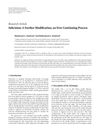 July 2020 in “CRS 2020 Virtual Annual Meeting”
July 2020 in “CRS 2020 Virtual Annual Meeting” Researchers developed a new skin patch that delivers more finasteride into the skin, potentially improving treatment for hair loss and prostate issues.
 April 2023 in “JIVA : journal of Indian Veterinary Association Kerala/JIVA :Journal of Indian Veterinary Association, Kerala”
April 2023 in “JIVA : journal of Indian Veterinary Association Kerala/JIVA :Journal of Indian Veterinary Association, Kerala” The dog fully recovered one month after treatment.
 31 citations,
April 2018 in “Royal Society open science”
31 citations,
April 2018 in “Royal Society open science” Sarcoptes scabiei infection causes significant health and behavior changes in wombats.
 3 citations,
November 2021 in “Clinical, Cosmetic and Investigational Dermatology”
3 citations,
November 2021 in “Clinical, Cosmetic and Investigational Dermatology” Platelet-Rich Plasma may improve skin health and reduce wrinkles, but more research is needed for standard treatment guidelines.
 November 2023 in “Advanced Science”
November 2023 in “Advanced Science” A specific hair protein variant increases the spread of breast cancer and is linked to worse survival rates.
 124 citations,
October 2019 in “Frontiers in Immunology”
124 citations,
October 2019 in “Frontiers in Immunology” Janus kinase inhibitors are promising treatments for autoimmune skin diseases like eczema and psoriasis.
 855 citations,
June 2009 in “The Journal of Clinical Endocrinology & Metabolism”
855 citations,
June 2009 in “The Journal of Clinical Endocrinology & Metabolism” The guideline recommends mental health involvement in diagnosing gender identity disorder and outlines hormone and surgical treatment protocols, emphasizing safety, informed consent, and long-term monitoring.
 November 2024 in “Health Science Reports”
November 2024 in “Health Science Reports” Light/laser therapy can effectively increase hair density in some types of alopecia, especially androgenic alopecia and alopecia areata.
November 2019 in “SLAS technology” New findings suggest certain genes and microRNAs are crucial for wound healing, and innovative technologies like smart bandages and apps show promise in improving treatment.
 September 2018 in “Facial Plastic Surgery Clinics of North America”
September 2018 in “Facial Plastic Surgery Clinics of North America” Biologicals are increasingly used in medicine and cosmetics, especially for skin and hair treatments, but more research is needed.
 1 citations,
January 2018
1 citations,
January 2018 Improve burn patients' appearance and function using various techniques, teamwork, and psychological support.
 May 2019 in “Journal of Cosmetic Dermatology”
May 2019 in “Journal of Cosmetic Dermatology” ABHRS surgeons got higher ratings on Healthgrades and lower on Yelp compared to nonsurgeons, with training affecting satisfaction differently across platforms.
 22 citations,
September 2018 in “Medical Clinics of North America”
22 citations,
September 2018 in “Medical Clinics of North America” Facial aging is caused by natural processes and external factors, and can be managed with preventative measures and a variety of treatments tailored to individual needs.
 20 citations,
October 2018 in “Aesthetic Plastic Surgery”
20 citations,
October 2018 in “Aesthetic Plastic Surgery” PRP shows promise for improving facial wrinkles, skin elasticity, and hair growth, but more research is needed to standardize its use and understand its effects.
 May 2016 in “Cambridge University Press eBooks”
May 2016 in “Cambridge University Press eBooks” Eating disorders are serious, often undiagnosed conditions requiring early treatment, with anorexia being the most deadly and binge-eating the most treatable.
 119 citations,
January 2012 in “Nutrition & Metabolism”
119 citations,
January 2012 in “Nutrition & Metabolism” Modern lifestyles, including poor diet, stress, and long-term use of certain medications, hinder the body's ability to heal from inflammation, leading to chronic diseases.
 28 citations,
December 2012 in “The American Journal of Cosmetic Surgery”
28 citations,
December 2012 in “The American Journal of Cosmetic Surgery” Proteins from stem cells improved hair growth in patients with hair loss.
 114 citations,
January 2021 in “medRxiv (Cold Spring Harbor Laboratory)”
114 citations,
January 2021 in “medRxiv (Cold Spring Harbor Laboratory)” COVID-19 can cause over 50 long-term symptoms, with fatigue and headache being the most common.
 12 citations,
March 2010 in “Revista iberoamericana de micología”
12 citations,
March 2010 in “Revista iberoamericana de micología” The cat died from a hard-to-treat fungal infection despite various treatments.
 24 citations,
September 2018 in “Journal of Materials Science: Materials in Medicine”
24 citations,
September 2018 in “Journal of Materials Science: Materials in Medicine” Hyaluronic acid-based HA2 hydrogel helps heal skin wounds better with less scarring.
 8 citations,
January 2012 in “Dermatology Research and Practice”
8 citations,
January 2012 in “Dermatology Research and Practice” New subcision technique with a bent needle and syringe improves ease, effectiveness, and comfort for treating acne scars.
 28 citations,
January 2011 in “Hearing Research”
28 citations,
January 2011 in “Hearing Research” Gene therapy, especially using atoh1, shows promise for creating functional sensory hair cells in the inner ear, but dosing and side effects need to be managed for clinical application.
 29 citations,
January 2010 in “PubMed”
29 citations,
January 2010 in “PubMed” FUE hair transplants offer minimal scarring and are good for short hairstyles but are time-consuming and can be costly.
 January 2022 in “Springer eBooks”
January 2022 in “Springer eBooks” Platelet-rich plasma therapy helps increase hair thickness and slow hair loss.
 18 citations,
August 2018 in “Facial Plastic Surgery Clinics of North America”
18 citations,
August 2018 in “Facial Plastic Surgery Clinics of North America” Lasers, microneedling, and PRP improve skin rejuvenation and repair, with PRP enhancing the effects when combined with other treatments.
 September 2011 in “Cancer”
September 2011 in “Cancer” Men who start losing hair at 20 may have a higher chance of getting prostate cancer later.
 15 citations,
May 2004 in “Facial Plastic Surgery Clinics of North America”
15 citations,
May 2004 in “Facial Plastic Surgery Clinics of North America” New techniques in hair restoration surgery can fix unnatural results from old methods, improving patient self-esteem.
 14 citations,
August 2014 in “Applied Physiology, Nutrition, and Metabolism”
14 citations,
August 2014 in “Applied Physiology, Nutrition, and Metabolism” A low-starch/low-dairy diet may help overweight women with PCOS lose weight and improve metabolism, but more research is needed.
 31 citations,
September 1999 in “Dermatologic Surgery”
31 citations,
September 1999 in “Dermatologic Surgery” Cooling hair micrografts during transplantation does not improve their survival or growth.
 January 2025 in “Burns & Trauma”
January 2025 in “Burns & Trauma” Skin organoids help improve wound healing and tissue repair.




























